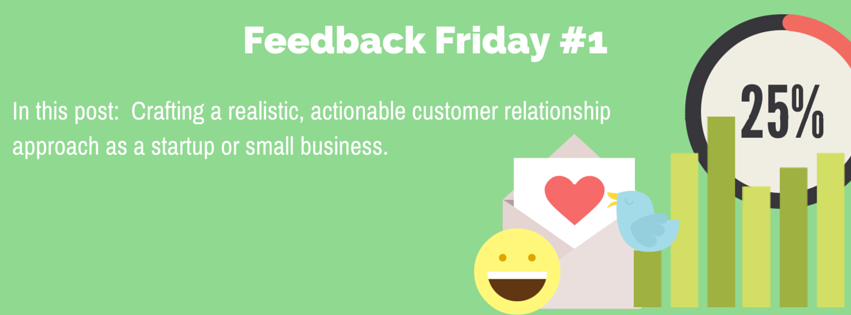In case you missed it, last week was Customer Service Week across the US.
I kept my finger on the pulse of discussion, social engagement, and articles published on the topic, hoping to glean some killer insights.
Instead, I saw a big ol’ dose of cliches:
- “The customer is always right!”
- “Be attentive to customer needs!”
- “Put yourself in the shoes of the customer!”
kjlyva.hjdfhhhhhhhhhhhhhhhhhhhhhhhh; – Whoops, sorry about that, I fell asleep on my keyboard for a second.
So much of what I saw was boring, and not even the type of boring that’s detailed enough to be useful. If we’re going to dedicate a week to sharing our collective knowledge about knocking customer interactions out of the park, we should at least be a tiny bit innovative about it, don’t you think?
Luckily, I saw a few ideas pop up that held a harsh, unforgiving mirror to the state of customer service in 2015.
Sometimes, what isn’t nice is still necessary. As much as it hurts me to write it – we’re a friendly group here, after all! – I think that assumptions about customer loyalty or at least brand opinion are a bit unrealistic.
Let’s dial it back to reality with some slightly harsh (but super actionable) insights for you on handling customer service, especially as a relatively new brand/startup/small business.
Harsh Reality #1) Your customers don’t care about you. And that’s putting it nicely.
One of the sentiments that every one of us has nodded along to at one point or another – while internally dismissing and fancying ourselves the exception – is that your customers owe you nothing. They don’t owe you awe for bringing what you think is a great product to market. They don’t owe you loyalty for offering them a solution. Nothing. Nada. Zip.
Before you ever start selling, advertising, or otherwise asking for something from your customers, you need to be giving them a reason that’s better than how great you think your own product is.
Every time you are about to ask a prospect for an action of any magnitude – from opening up their wallet to answering an email – you should be asking yourself these questions:
- Is the utility I’ve offered to the customer worth more from their perspective than the price or weight of the commitment I’m asking for?
- Has the customer mentally agreed to the problem you solve being one of importance to them?
- Am I able to support this purchase or action with stellar care and service after the fact?
If the answer’s yes, you can pass Go and collect your $200… or hopefully much more.
While this first point is framed in the context of customer acquisition, it applies tenfold to customer service – don’t assume that because someone is a customer they will be one forever, don’t assume they think you’re the greatest thing since sliced bread. Instead, convince them of it through stellar attentiveness and responsiveness.
Harsh Reality #2) In Customer Service, One Squeaky Wheel Means 20 Have Already Fallen Off
I know, I know, you’re wondering “what kind of vehicle has over 20 wheels?!” – but they exist, just trust me on this one.
Anyways, you’ve probably heard the phrase “the squeaky wheel gets the oil.”
As a child, I took this expression to mean that the person who was the most annoying about something would be the first one to get their way.
In business, that’s actually a fairly accurate representation.
The thing you have to realize is that yes, sometimes customers will go out of their way in airing dirty customer service laundry to try and get special treatment. But in other cases, people have had a particularly bad experience and just want to be helped out to get their product or service working as intended.
You should treat both situations exactly the same.
The reason for this is that no matter the reason behind a complaint, those who have negative experiences to share are more likely to spread their stories the furthest.
In fact, research has shown that customers who have had a bad experience with a brand will turn around and tell, on average, 10 people about their bad experience.
But wait, it get’s worse: In turn, each of those 10 people spread the story to an average of 5 people. One bad experience is suddenly on the ears of 50 people. Yikes.
But that’s still not even the most important reason why you should quickly attend to pissed off customers!!!
See, for every one unhappy customer who complains, there are many more who won’t bother actually phoning you up or tweeting at you, but what they will do instead is much worse:
They’ll slowly get fed up and then leave your brand for good.
You won’t ever hear why, and you won’t ever have a chance to save your relationship with them.
The impact of the silent masses that slip away without even giving you feedback should be way scarier to you than someone complaining in public!
Usually, the silent ones have similar complaints to those who bother actually getting in touch, which means addressing the complaints you do get in a timely manner is likely to have an exponential improvement effect on reducing your customer churn rate.
In that sense, every bad experience is an opportunity to do a lot of good. Pretty cool, right?
Harsh Reality #3) You’ve Got Two Choices When It Comes To Customer Service: Be Fast, Or Be A Failure
Offering excellent customer service can be an elusive beast. Not just in making sure you accurately and fully address a problem or question – in fact, that’s pretty easy if you listen well – but in addressing that problem in a timely manner.
Think of it in terms of a super-simple-story (an SSS, one might say; I like that, and you heard it here first):
Anyways, say Ms. Small Business Owner reaches out to two services they think might be able to help them in collecting customer feedback. They’re really keen on having the ability to automatically track trends in their feedback data over time, however, and you this functionality is a requirement.
Ms. Small Business Owner sends an email to each company asking if this feature is available.
Company A responds in an hour, “Yes, we do – and we’d be happy to show you how to set it up!”
The next morning, company B responds, “Yes we do – and we’d be happy to show you how to set it up!”
But company B never hears back from Ms. Small Business Owner, because she’s already setup a subscription with company A. And just like that, there’s one hot lead, wallet out and ready to pay, gone forever.
Timing is everything, and when it comes to customer service being speedy in your responses is a surefire way to cultivate some good customer relationship karma. Also:
It’s 2015, and there is no excuse for slow customer service!!!
You don’t just have a telephone number. You don’t just have an email. You don’t just have a livechat pluggin for your website. You’ve got all of those things AND 237,846, 124 social media channels!
Companies of all sizes have started fielding customer complaints with custom twitter accounts that get included in their list of support or ‘Contact Us’ posts.
Wherever your customers hang out, consider opening up these platforms. If your phone buzzes, you make a swift reply, and your customer thinks “Holy cow, I just sent them a question thirty seconds ago – they’re on it!”
Even if you have to buy some time with a canned “we’ll look into this and get back ASAP” type response, you’ve still opened up a dialogue quickly, and people appreciate that. Remember company B from the example? Don’t be company B.
There is one major caveat here: Fast service is not a substitute for good service. In fact, a few years back several popular articles cited research showing that customers left brands more often for poor customer service, rather than slow service.
The reality is that both are important, and have to work in tandem. That said with the social climate we live in today, I would be willing to bet that the same poll might find consumers placing more weight on speed of service. Food for thought.
#4) Be A Verbal Punching Bag, And Be Happy About It 😀

“Sir, I actually love how much you’re yelling at me today, let’s try and keep that up for another 15 or 20 minutes.”
One of the most exciting, but also the most dangerous, aspects of working in a small business or startup is that things like tone-of-voice and what’s considered an appropriate interaction for your business might not be thoroughly established.
While it’s freeing to not have a corporate structure limiting your expression on social media, it can also get people into trouble when their brand accounts start to reflect personal reactions.
Regardless of the public face you want your company to portray, customer service is one facet that should be always handled as if you have a billion rules in place outlining the perfect way to interact with a customer in excruciating detail.
That is to say, you should be polite, professional, and humble no matter what.
Don’t get emotional. Even if your company is like your baby, any complaint a customer has, no matter how upset they may seem, is not an attack on you personally. They’re purely reacting to the service they believe they’ve received, and they’re looking to the company responsible to make it right.
Don’t argue. This should be a given, but we’ve all dealt with a customer support agent who decided to get an attitude when things escalated, and we also know that it does nothing to help the situation.
If a customer says something happened, that’s what happened; just go with it and give them the benefit of the doubt as you try to work towards a solution.
See problems for the constructive challenges that they are. Finally, you should be viewing all of your customer interactions, no matter how negative the slant, as ways to grow.
Ask:
How can we deliver the best possible solution at this point?
How can we make sure that such a problem doesn’t happen again?
How can we find out about and reach out to others who may be having similar problems but haven’t actively reported them or made complaints?
You get the idea.
As far as I’m concerned, mastering the darker sides of customer service lead to a stronger brand overall.
Got any customer service horror stories? What actions have your companies taken in direct response to customer feedback?
Drop a comment below, we’d love to hear it!
———
